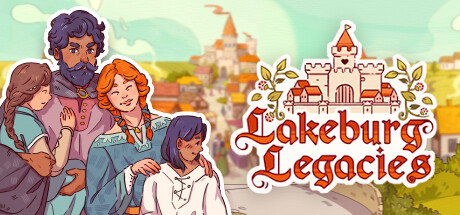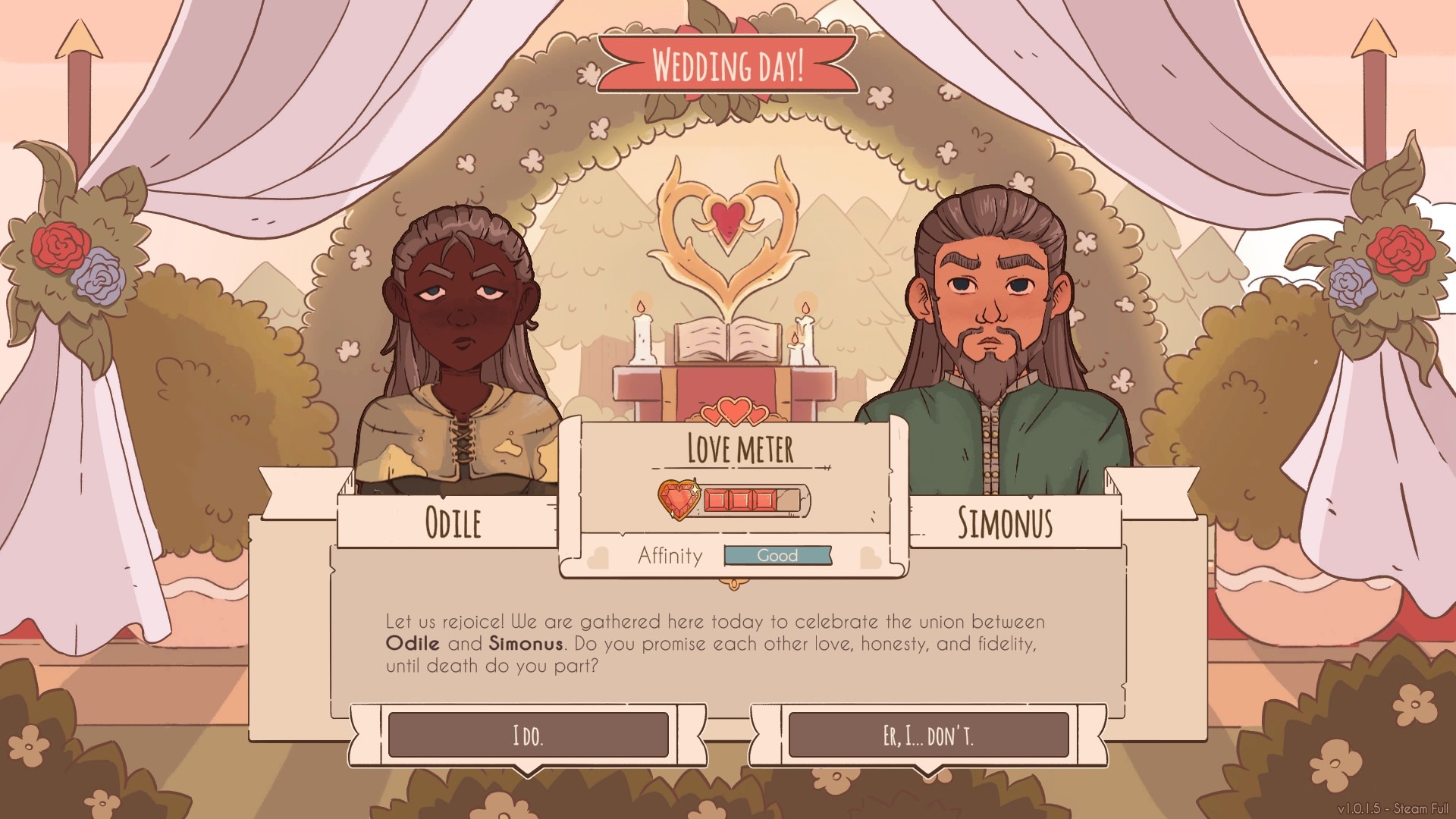
Lakeburg Legacies
Lakeburg Legacies is an original blend between a social simulator and a resource management simulator. Half of the time will be focused on expanding the little town of Lakeburg with new buildings and balancing out their resource production and consumption, while the other half will be spent matchmaking single people and managing the relationships between townsfolk. Think of it as a much lighter version of Crusader Kings games, but instead of conquering other territories and instating new rulers there, you’ll build various production buildings and assign suitable workers from the existing inhabitants.
The game has a hefty set of mechanics, and there are a lot of stats to keep track of, both in regards to the resources managed, as well as various traits that the people have. Luckily, the UI is great at showing the player everything they need to know in the blink of an eye and is specifically designed to facilitate quick navigation between various information categories, while also providing some very useful filters to narrow down essential information such as which person is best for a certain workplace, their proficiency for a certain job type, their career aspirations, relationships with fellow townsfolk, etc. The tutorial is equally well done and it explains all the mechanics in detail, as they are gradually introduced.

Every time you’ll want to find a suitor for someone, the old witch Tindra (funny name pun) will guide you through a minigame. Each person has a specific set of three likes and three dislikes, therefore you’d want to pair them with someone who shares at least one or two common likes / dislikes. This is done by declining the proposed candidates (which are randomly generated) until you find one that appears to be at least a good match if not an excellent one. The second stage of the minigame consists in choosing the correct topic of conversation out of two possible choices, based on the other person’s likes or dislikes.

The couple goes on three dates, therefore you will have three opportunities of choosing the right answer. This will eventually decide how compatible the two people are and how stable their love life will be (more correct answers mean a better relationship for the couple). The gimmick here is that you don’t have access to the sets of likes or dislikes of the pair when confronted with one of these choices, and this is probably done so that you can have some variety or drama regarding the couple’s lives. Same-sex marriages are allowed, and before attempting to find a partner for someone there’s a choice between finding a suitor among men, women, or mixed genders. This minigame is quite fun for the first 10 times you play it, but when you have a big population, it becomes extremely repetitive and redundant.

The town population increases either by recruiting a new person (available only at specific times), wedding an inhabitant to someone outside of Lakeburg (thus making the other person move in), or by waiting until a couple produces offspring which eventually will grow up into adults and continue the cycle. Randomly generated events occur not only in the game world, but also in each household, increasing or decreasing the couple’s bond. Each couple (including the same-sex ones) also has a certain desire for kids, and depending how eager they are to do so, you’ll need to make sure that these kids have enough space in the household by unlocking extra rooms. It’s nice that the children inherit not only Traits (attributes) from their parents but also visual details (hair, skin color, face type) from them, making them look more like their actual children rather than yet another NPC with randomly generated features.

Each resident has a set of strengths that make them more suitable for certain jobs than others, but they also have career targets or specific job preferences. The production rate of the buildings depends on the workers assigned (how competent they are for that position), but you can also spend gold on increasing the efficiency, improving the working conditions or expanding them to produce several resources instead of one. The relationships between villagers will also affect their work ambiance, so you will want to allocate people to production buildings not only based on their proficiency but also based on the relationships between potential co-workers. Additionally, each worker can take one or more children as their apprentice, increasing their proficiency for that respective job.
The building aspect of the game is rather rigid. You can’t build multiple buildings of the same type, and the buildings that you can create are unlocked sequentially. Once you have enough resources to build the next building from one of the three category chains (primary resource generation, industry / production buildings, public services buildings), you will be able to buy it and start assigning workers to it. Unfortunately, each playthrough will end up looking the same, because the placement of the buildings is predefined and automatic – the player will not be able to choose the layout of their town.

The game is heavily customizable regarding its length (you can choose between playing a short, a medium and a long game, with an additional endless mode recently added based on popular request) and difficulty (various sliders to adjust the economy and penalties are available). Depending on how successful you are (prestige gained), at the end, you will be credited a certain amount of diamonds that you can then spend to unlock some extra backgrounds / images in a separate collection, unrelated to the game. A short game (30 years) on the easiest difficulty took me roughly six hours to complete, and I was then able to unlock one out of the 33 available backgrounds. While the game is enjoyable enough if you don’t mind its repetitiveness, I don’t think that these images provide a strong enough motivation for me to spend another ~150h in repeated playthroughs of essentially the same thing. The achievements are also quite grindy, partially oriented toward accomplishing certain milestones in one playthrough (requiring pretty much playing the more lengthy ones), partially based on RNG.

Lakeburg Legacies is a decent game with some very well-tuned mechanics, but I do feel that it lacks a certain spark to keep most players interested in it long-term. It’s certainly nice to finish one playthrough or two, but the incentive to play beyond that is rather lacking. If you find it fun to create your own little drama in a small town by role-playing God and matchmaking or breaking up couples, forcing them to have children or on the contrary to be abstinent, marrying a priest to a pleasure house worker, enhancing the adultery or lustful traits or organizing coup d’etats, while also micromanaging your economy and resource production to afford all of the above, then this is certainly a game for you.
Disclaimer: This review is based on a press preview copy of the game, kindly provided by Ishtar Games via The Indie Game Collective.